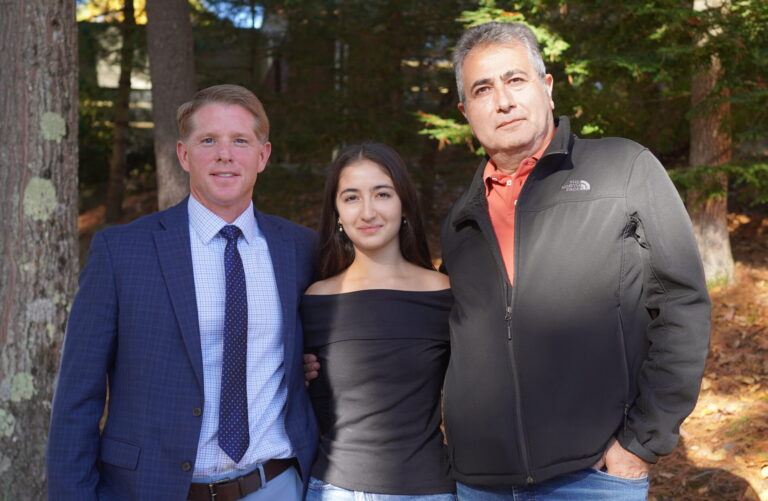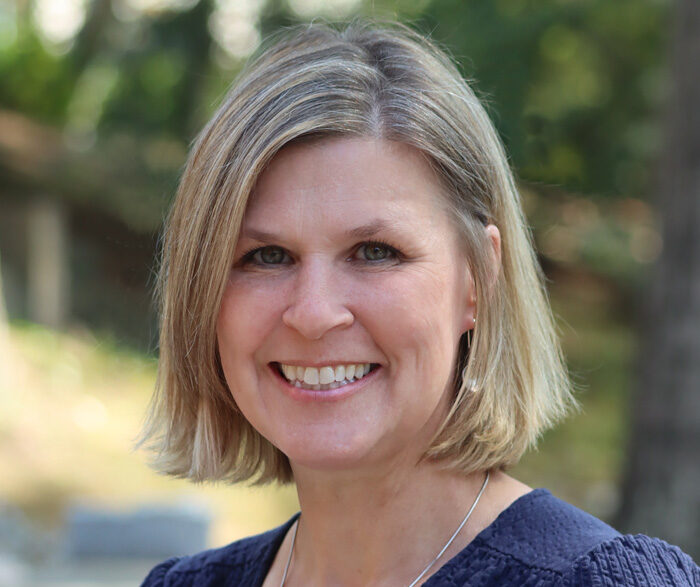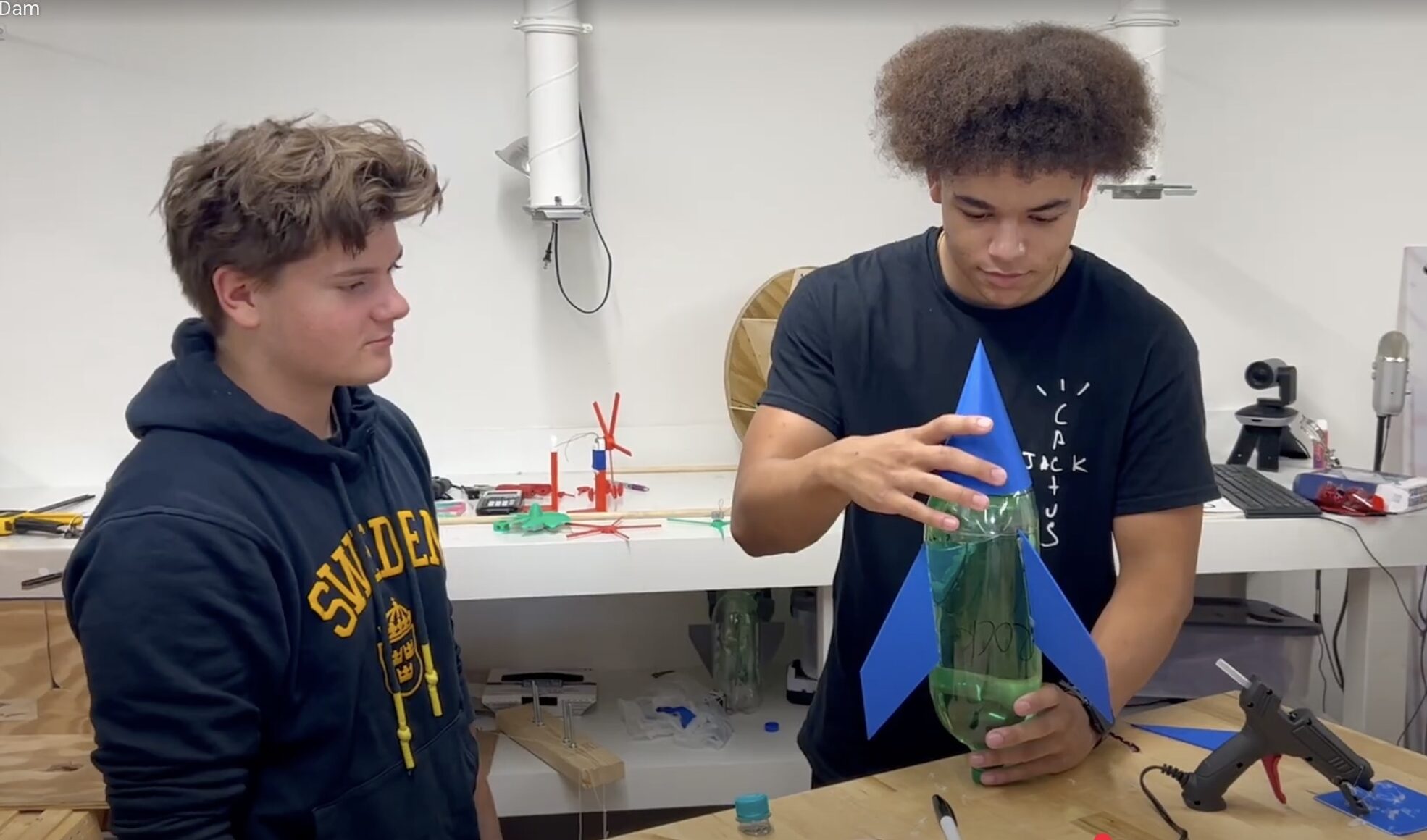Elaine Loft, Staff Writer
Each year The Derryfield School chooses a member of the senior class to receive an award in honor of Simeon Kass, who survived the Holocaust as a young boy. The Boelig Family, who had two children graduate from Derryfield, were friends with Kass late in his life. They created the Simeon Kass award in 2007 to honor Kass, his life experiences, and his passions. “Uncle Sim,” as he was known to the Boelig children, was a Jewish Parisian whose mother and two young brothers all died at Auschwitz.
The award is presented in the fall to a Derryfield senior who demonstrates outstanding writing skills, an appreciation of other cultures, a burning inquisitiveness, and the disposition to take a position and challenge perceived opinions. The 2024 recipient, announced on October 22 during the school’s weekly Community Meeting, is Ipeksu Yucel ‘25.
Yucel’s essay, entitled “Through the Window,” discusses an experience she had while visiting relatives in Turkey when she was six years old. While riding in the backseat of an old Renault, she observed a young girl, a Syrian refugee, who was in the middle of the street, attempting to sell cigarette packets and tissues to stopped motorists. Yucel reflects back on the effects of her brief encounter with that stranger.
“It’s strange, the way a moment can fracture your understanding of the world. In that car, under that unforgiving sky, I didn’t yet know how to articulate the feeling that had settled in my chest. All I knew was that something about the world had shifted. I had been naïve, too young to understand the mechanics of injustice, but old enough to recognize its shadow when I saw it.
The world is cruel and unfair. That seemed to be the best conclusion I could come to at all. But in accepting that, am I too the problem? Is this belief that the way that things are, are for some inexplicable reason or another, the way that things are meant to be, far too passive? I’ve decided I refuse to accept that as an answer. Because I believe only one part of that statement is true. The world is cruel. But not because the world inherently is, but because we have decided that is how it will be.
But if we close our eyes to the suffering, if we dismiss the faces we pass by as mere shadows, then we become complicit. And so, this is the conclusion I’ve come to: the world is indeed cruel, but it does not have to be. It is only in the silence of our indifference, that we bury the very essence of what it means to be human.”
According to the Boeligs, Kass carried around a notebook everywhere he went, taking notes and writing down phrases – he was always learning, and was always inquisitive. Although he lost much of his family, what the Boeligs remember are his resilience and love of life. Kass honored the power of education to push back the darkness of prejudice, fear and brutality. He believed that knowledge, when combined with a burning curiosity and compassion, illuminates the most beautiful things in this world. So too did the founders of Derryfield.
Full award-winning essay, by Ipeksu Yucel ’25:
Through The Window
The air was hot. Thick and sticky, the type of oppressive heat that threatens to engulf you whole, a trademark of Adana in mid-July. I shifted uncomfortably in the back of the taxi, my head resting against the slightly open window, my mind blank, consumed only by the unshakable feeling of suffocation. It was 2013. I was six years old, and my parents had sent me to live with my family in the southeast of Turkey. That’s how I found myself sitting in the back of an old Renault clio, my aunt and the driver engaged in some far off discussion about politics and war while the lyrics to an 80’s pop song emerged through
the static.
The car moved slowly, grinding to a halt as the light in front of us turned red. It was then that I saw her – small, dirt-streaked, with sunburnt skin and dark hair that stuck to her forehead. She weaved in and out of the traffic, her sandals, if they could even be called that, slapping against the hot asphalt as she moved. I eyed her curiously, my attention drawn to the plastic bag hanging from her arm, filled with cigarette packets and tissues. She was three cars ahead of us. Then two. Then from the corner of my eye I watched as the driver slid his arm back and furiously began cranking the window handle, never once breaking in conversation, as if this was some unspoken but familiar protocol. Clearly mine was not the only attention she’d caught.
Though I’d been in the car for well over thirty minutes, largely detached from the adults’ conversation, suddenly I found myself hanging on every word. “Syria.” “Crisis.” “Refugee.” Though I spoke the language completely, the words felt entirely foreign. I felt their weight yet I could not then understand their burden.
My attention was broken by three, short taps on my window. Tap. Tap. Tap.
I flinched, my gaze snapping back to the window where she stood. Her eyes locked onto mine, dark and wide, brimming with something I couldn’t quite name. Her hand, small and delicate, clutched a half-crumpled pack of tissues against the glass, her lips slightly parted in a silent plea. I wanted to look away, pretend I hadn’t seen her. I wanted to turn to my aunt and ask her to explain, to make sense of why this girl, who looked like she could be in my class back home, was standing in the middle of traffic under the unforgiving sun, selling tissues.
But instead, I stayed frozen, my hands clenched tightly in my lap. It was then that I couldn’t help but realize how remarkably similar we looked. Her deep olive skin, sharp features, and coffee colored hair. Though just moments ago I had been unable to breathe under the weight of the heat, I now felt feverish and watched as goosebumps trickled up my skin. It was her eyes I remember most. Because they mirrored mine entirely. Naive, hopeful, but utterly terrified of the world moving rapidly around us, afraid that if we stopped even for a moment, that it would pass by and leave us in the dust.
The light turned green. The driver wasted no time, the car jolting forward, leaving her standing there in the rearview mirror. I craned my neck to keep watching, but the distance grew until she was just a blur of colors— dark jeans, black t-shirt, plastic bag swinging back
and forth.
For the rest of the ride, I barely moved. My aunt and the driver carried on with their conversation, oblivious to the weight that had settled deep in my chest. The world outside blurred as we passed by other cars, other people, other lives. But all I could think about was her—how her feet must have burned against the pavement, how her mouth might have been dry from the heat.
In my few, short years of life I’d had very few reasons to be angry. But now it bubbled uncontrollably inside of me, threatening to escape, radiating from my skin, and seething through my teeth. I was so angry. And I was so confused.
Days passed, but the anger didn’t. It settled into my bones, low and constant, like a slow-burning flame. In the evenings, when the house grew quiet and the air cooled just enough to make the heat bearable, I would lie awake and think about her. I would imagine her lying somewhere on the streets, trying to fall asleep with the hum of traffic in the background. I would wonder if she was scared, if her stomach ached with hunger, if she ever looked up at the sky and asked the same question I was asking: Why?
I hadn’t grown up in a religious context but the idea of benevolent God wasn’t so far removed from me. But if I had ever had any doubts about his lack of existence, they were certainties now. For I could not, and still cannot, bring myself to believe that there is some higher power who would subject one to this cruel fate. What could she have possibly done, a girl barely old enough to ride a bike, that would make one believe that she is deserving of inhumanity? And what I had done, but be born in the right place at the right time, to warrant any more than that?
I started to notice everything after that. The kids playing football in the streets with bare feet, their clothes tattered and worn. The women sitting on the sidewalks, their faces lined with exhaustion, selling whatever they could—a few vegetables, some second-hand clothes. The men with hard expressions, leaning against the walls of buildings, watching the world pass them by. I started to notice the way people looked at them, or rather, the way they didn’t.
It’s strange, the way a moment can fracture your understanding of the world. In that car, under that unforgiving sky, I didn’t yet know how to articulate the feeling that had settled in my chest. All I knew was that something about the world had shifted. I had been naïve, too young to understand the mechanics of injustice, but old enough to recognize its shadow when I saw it.
The world is cruel and unfair. That seemed to be the best conclusion I could come to at all. But in accepting that, am I too the problem? Is this belief that the way that things are, are for some inexplicable reason or another, the way that things are meant to be, far too passive? I’ve decided I refuse to accept that as an answer. Because I believe only one part of that statement
is true.
The world is cruel. But not because the world inherently is, but because we have decided that is how it will be.
It took me years to realize that what I had witnessed in Adana wasn’t an isolated incident—it was a symptom of a much larger disease, one that continues to consume the world even now. The plight of the refugee, the displaced, the voiceless—they are all reflections of a broken system that thrives on inequality, a world where the place of your birth determines your worth. It is a world where borders dictate who gets to live in peace and who is forced
to flee.
And in those ten years, I have never stopped thinking about her. And each time I see her differently, I wondered if anyone saw her as I had? Or had she too become just another nameless face in the sea of suffering that we had grown numb to?
But if we close our eyes to the suffering, if we dismiss the faces we pass by as mere shadows, then we become complicit. And so, this is the conclusion I’ve come to: the world is indeed cruel, but it does not have to be. It is only in the silence of our indifference, that we bury the very essence of what it means to be human.



